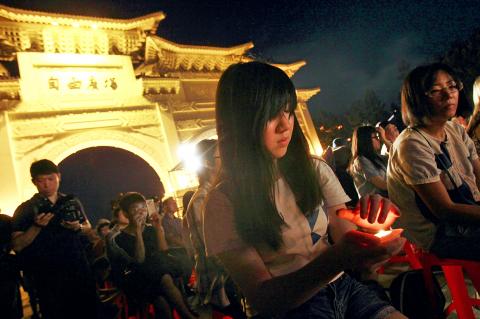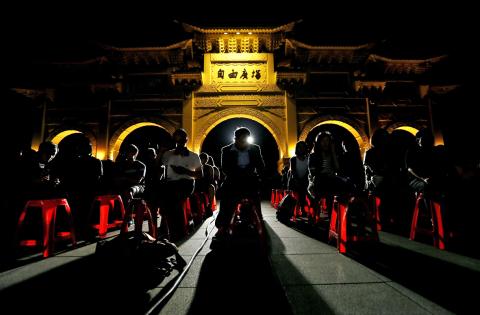Several hundred activists last night gathered in Taipei’s Liberty Square for an event commemorating the 1989 Tiananmen Square Massacre in Beijing, condemning continued human rights abuses by the Chinese government.
Organized by the Student Workshop for Promoting China’s Democracy, the New School for Democracy, the Friends of Liu Xiabo (劉曉波) and the National Taiwan University Student Council, and with the support of a handful of local human rights groups, the event’s site was symbolic, as it was the location of important student demonstrations during Taiwan’s democratization, including an overnight rally on June 3, 1989, in support of the protesters in Tiananmen Square in Beijing.
Lights were dimmed and several moments of silence were observed for the massacre victims, with last night’s event marked by songs interspersed with speeches by several prominent overseas activists, along with Taiwanese human rights figures, who at one point took to the stage holding photographs of political prisoners.

Photo: Chiang Ying-ying, AP
“The spirit of Tiananmen is extremely important to us Tibetans, because we also have been oppressed,” said Lukar Jam, an activist with the Gu-Chu-Sum Movement of Tibet who flew in from India for the event. “The struggle against authoritarianism cuts across nationality and citizenship.”
Wuer Kaixi, an ethnic Uyghur political dissident who participated in the 1989 Tiananmen protests, said President Tsai Ing-wen’s (蔡英文) statement yesterday about the massacre was “disappointing,” because it used “incident,” not “massacre” to refer to the event.
He said “incident” echoed official Chinese government terminology downplaying Tiananmen’s severity, adding that Tsai saying that she did not desire to “point fingers” at China’s political system was also disappointing.

Photo: RITCHIE B. TONGO, EPA
“We have never felt that China’s democratization was the responsibility of Taiwan and Hong Kong, but China’s democratization would absolutely serve as a guarantee of Taiwan’s and Hong Kong’s democracy, so pushing forward China’s democracy is a project we can work on together,” Wuer Kaixi said.
“The issue of Tiananmen should not be something that separates people who identify as Taiwanese or Chinese,” he said, adding that the absence of Chinese students from yesterday’s event might be the result of a message by the event’s organizers.
Event coordinator Chou Ching-chang (周慶昌), a member of the Student Workshop for Promoting China’s Democracy, said that “three to five” Chinese students had volunteered behind the scenes, attributing the low participation to the event’s sensitivity, while other activists said Chinese students organized another event at Shih Chien University in Taipei.
While the annual Tiananmen memorial event was originally hosted by the Bound with Blood Friends of the Mainland Democratic Movement, which emphasizes common “Chinese” ethnicity, in recent years the event’s focus has shifted to emphasizing universal human rights concerns with a broad “pan-green” participation.
“While back in the day you could make appeals to patriotism, Chinese nationalism does not have the same attraction anymore,” Taiwan Human Rights Association secretary-general Chiu E-ling (邱伊翎) said.
Representatives from the Democratic Progressive Party were notably absent from the event, which featured speakers from the Chinese Nationalist Party (KMT), the Green Party Taiwan, the Social Democratic Party and the New Power Party, with Chou attributing their absence to the short notice given by the organizers, whom he said invited political representatives only last week because of “rushed” preparations.
Activists said that the event’s planning was thrown into disarray by the withdrawal of the Taiwan Association for China Human Rights, which had previously provided half of the event’s funding.

The US government has signed defense cooperation agreements with Japan and the Philippines to boost the deterrence capabilities of countries in the first island chain, a report by the National Security Bureau (NSB) showed. The main countries on the first island chain include the two nations and Taiwan. The bureau is to present the report at a meeting of the legislature’s Foreign Affairs and National Defense Committee tomorrow. The US military has deployed Typhon missile systems to Japan’s Yamaguchi Prefecture and Zambales province in the Philippines during their joint military exercises. It has also installed NMESIS anti-ship systems in Japan’s Okinawa

‘WIN-WIN’: The Philippines, and central and eastern European countries are important potential drone cooperation partners, Minister of Foreign Affairs Lin Chia-lung said Minister of Foreign Affairs Lin Chia-lung (林佳龍) in an interview published yesterday confirmed that there are joint ventures between Taiwan and Poland in the drone industry. Lin made the remark in an exclusive interview with the Chinese-language Liberty Times (the Taipei Times’ sister paper). The government-backed Taiwan Excellence Drone International Business Opportunities Alliance and the Polish Chamber of Unmanned Systems on Wednesday last week signed a memorandum of understanding in Poland to develop a “non-China” supply chain for drones and work together on key technologies. Asked if Taiwan prioritized Poland among central and eastern European countries in drone collaboration, Lin

NO CONFIDENCE MOTION? The premier said that being toppled by the legislature for defending the Constitution would be a democratic badge of honor for him Premier Cho Jung-tai (卓榮泰) yesterday announced that the Cabinet would not countersign the amendments to the local revenue-sharing law passed by the Legislative Yuan last month. Cho said the decision not to countersign the amendments to the Act Governing the Allocation of Government Revenues and Expenditures (財政收支劃分法) was made in accordance with the Constitution. “The decision aims to safeguard our Constitution,” he said. The Constitution stipulates the president shall, in accordance with law, promulgate laws and issue mandates with the countersignature of the head of the Executive Yuan, or with the countersignatures of both the head of the Executive Yuan and ministers or

BACK TO WORK? Prosecutors said they are considering filing an appeal, while the Hsinchu City Government said it has applied for Ann Kao’s reinstatement as mayor The High Court yesterday found suspended Hsinchu mayor Ann Kao (高虹安) not guilty of embezzling assistant fees, reducing her sentence to six months in prison commutable to a fine from seven years and four months. The verdict acquitted Kao of the corruption charge, but found her guilty of causing a public official to commit document forgery. The High Prosecutors’ Office said it is reviewing the ruling and considering whether to file an appeal. The Taipei District Court in July last year sentenced Kao to seven years and four months in prison, along with a four-year deprivation of civil rights, for contravening the Anti-Corruption